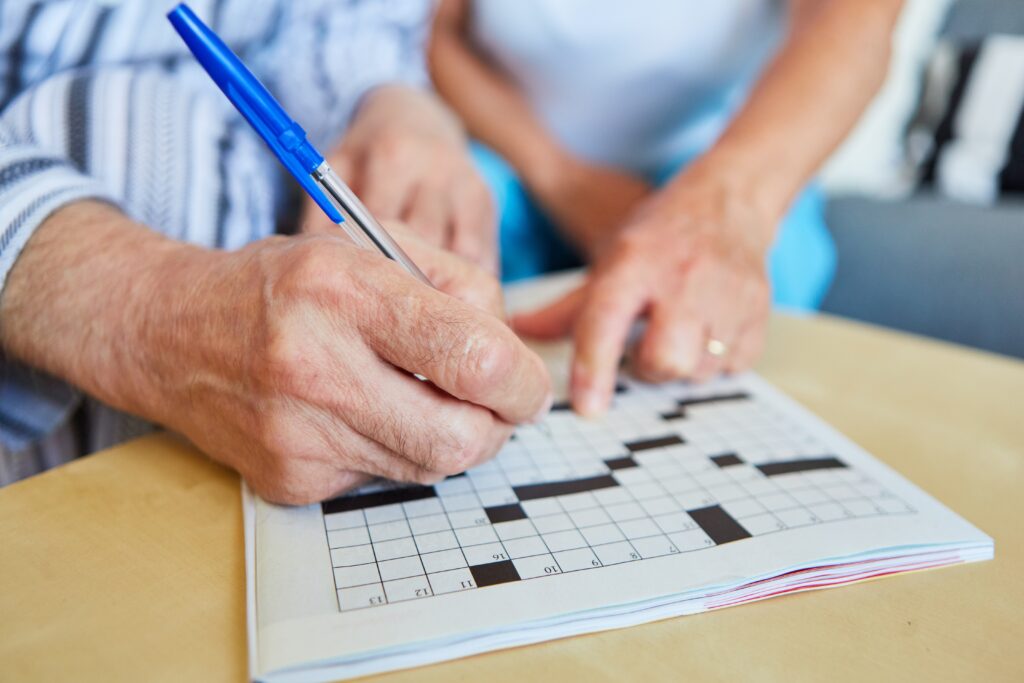By Megan Madden, M.D., neurology

Whether you worry about brain fog today or dementia down the road, I have good news for you: What you do for fun, food, recreation and relaxation can greatly influence how well your brain works, both now and in the future.
Here are 10 things you can do to improve your brain:
- Exercise your body. Physical exercise is far and away the best thing you can do for your brain. Studies show that it increases blood flow and connectivity in the brain. Aerobic exercise, in particular, significantly increases brain volume and preserves the gray matter that typically declines in old age. A recent study of 61,000 adults found that people with high levels of fitness were 40% less likely to develop dementia later. Even people with genetic risks for dementia decreased their odds by 35%. Bottom line: Keep moving.
- Exercise your brain. Like a muscle, a brain that isn’t challenged regularly gets weaker. But the opposite is also true: a brain that is regularly engaged grows stronger. A 2003 study found that people who play board games, read books and do crossword puzzles cut their risk of Alzheimer’s disease by nearly two-thirds. Many more recent studies support these benefits. To really give your brain a workout, try something completely new and unusual for you. If you’re a math person, try painting. If you spend most of your time at a computer, master a new instrument or language.
- Do old things a new way. Besides learning new skills, a great way to exercise your brain is to switch up the way you do the same old things. Using the opposite hand to brush your teeth, for example, can be surprisingly challenging for your brain, and may force it to work a less-used area of your brain.
- Turn off the TV. Watching TV is a passive and sedentary activity that exercises neither your body nor your brain. While it may be relaxing in small doses (no more than an hour), too much TV time is associated with higher dementia risk. It also can affect your ability to concentrate, and keeps you from more beneficial activities, like that walk you couldn’t find time to take.
- Turn on some music. Unlike watching TV, listening to music is a complex brain process that seems to have strong connections to both attention and memory. In a 2008 study, stroke patients who listened to music for one to two hours daily had better improvement in attention, verbal memory and mood. Other studies suggest that healthy people reap the same benefits.
- Get social. Join a book club or bowling league. Invite friends over to play cards or board games. Face-to-face socializing stimulates your brain, gets you out of your routines and lifts your mood. In midlife and later, it also may reduce your dementia risk by 30 to 50%, according to the journal Nature.
- Feed your head. Antioxidants and omega-3 fatty acids — especially from food, rather than supplements — nourish and protect your brain. Studies have found that people who eat a lot of antioxidant-rich fruits and vegetables, such as leafy greens, tomato sauce, blueberries and broccoli, have less Alzheimer’s disease. The omega-3 fatty acids found in many types of fish, nuts and seeds also benefit your brain’s nerve cells and stave off cognitive decline.
- Don’t smoke. A large study showed that smoking is associated with poor memory and reasoning abilities, which may accelerate dementia later in life.
- Grab a nap. Hundreds of studies have confirmed the beneficial effects of sleep on memory. Sleep also is a proven creativity enhancer, improving the ability to solve problems and to come up with creative ideas and insights. Even short, 6-minute naps have been shown to improve cognitive function. Try to get seven or eight hours of good, restorative sleep each night. If that’s not possible, grab a power nap in the afternoon.
- Meditate. Research suggests that meditation benefits attention span, perception, sensory processing, working memory and other cognitive capacities. In some studies, it has even been associated with increases in the thickness of parts of the brain.


